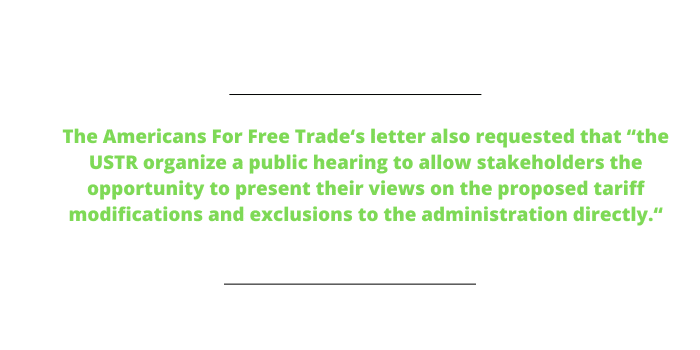PPAI has signed onto a letter issued by Americans For Free Trade (AFT) to the United States Trade Representative (USTR) requesting an extension on the comment period for proposed modifications to existing tariffs on imports from China under Section 301.
- The current comment period for the proposed modifications goes until June 28, 2024.
- If made final, the proposed modifications would significantly increase Chinese tariff rates for products in the “strategic sector” largely related to innovation and clean energy.
- The letter requests that the comment period be extended by at least 30 days.
“Our members have indicated that they require additional time to gather and assess such information given the breadth of HTS [Harmonized Tarriff Schedule] lines involved and given the prescribed comment format on USTR’s docket,” the letter reads.
- To read the AFT’s letter in full, click here.

Background/Details Of Tariff Modifications
In late May, the USTR made public the long-awaited report of its four-year investigation into Section 301 Chinese tariffs that were initially put in place by the Trump Administration in 2017. These tariffs were established after an investigation concerning China’s trade practices, concluding that the country was guilty of several practices deemed suspicious or unfairly burden the U.S.
Temporary exclusions for several categories of goods had been granted concerning the tariffs, but on May 31 many of those exclusions expired, affecting hundreds of products.
U.S. businesses ranging across myriad industries awaited the results of the four-year investigation, largely hoping that it might bring findings that would justify easing the Chinese tariffs on products relied upon by many small and large businesses.
- The investigation considered the tariffs affects on the U.S. economy, the supply chain and how effective the tariffs were in curtailing China’s unfair practices.
“China has not eliminated many of its technology transfer-related acts, policies and practices, which continue to impose a burden or restriction on U.S. commerce,” the investigation reported. “Instead of pursuing fundamental reform, China has persisted, and even become more aggressive, particularly through cyber intrusions and cybertheft, in its attempts to acquire and absorb foreign technology, which further burden or restrict U.S. commerce.”
- The report also stated that the tariffs “have had small negative effects on U.S. aggregate economic welfare, positive impacts on U.S. production,” a claim that would likely be debated by many businesses or industries.
In reaction to the report’s findings, the USTR has proposed changes that will introduce or increase Chinese tariffs in sectors at rates of 25%, 50% and 100%.
- There will be a formal review period in which industries, consumers and businesses can provide comments. The comment period is currently set to end on June 28, 2024.
Sectors in which Chinese tariff increases will be put in place under the proposed modifications include but are not limited to:
- Semi-conductors
- EVs
- Facemasks
- Permanent magnets
- Steel and aluminum products
A complete list of products that are subject to tariff increases under the proposed changes can be found in Annex A of the Federal Register’s notice.
AFT’s (and PPAI’s) Stance
The letter sent to the USTR by Americans For Free Trade officially requests that the comment period be extended a month or more to at least July 28, in order to give U.S. businesses and industries proper time to provide accurate insight into how they will be affected by the proposed changes.
- The letter also requests that the “USTR organize a public hearing to allow stakeholders the opportunity to present their views on the proposed tariff modifications and exclusions to the administration directly.”
Joining PPAI in the signing of the letter are hundreds of other associations and organizations, including:
- PRINTING United Alliance
- Technology Trade Regulation Alliance
- United States Council for International Business
- International Foodservice Distributors Association
- National Retail Federation


